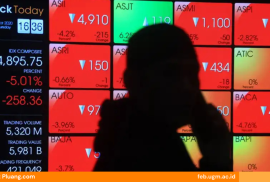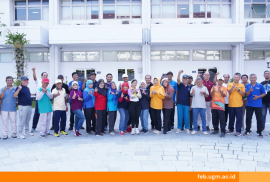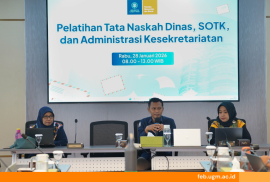Faculty of Economics and Business Universitas Gadjah Mada (FEB UGM) in the framework of the 64th anniversary held the 4th Gadjah Mada International Conference on Islamic Economics and Development (GAMAICIED), 4th Gadjah Mada International Conference on Islamic Accounting and Finance (GAMAICIAF), and 4th Gadjah Mada International Conference on Islamic Business Research (GAMAICIBR). The international conference was held in the 8th Floor Auditorium of the Center for Learning of the Faculty of Economics and Business, (30-31/08).
There are three major themes that were carried at the conference such as Entrepreneurship and Economic Development, Accounting and Entrepreneurship: Islamic Perspective, and Entrepreneurship in The Islamic Context. The conference includes two agendas, the first is Plenary Session, which is a presentation session from experts and academics, and also a Presentation session, which is a presentation session by GAMAICI Call for Paper participants who successfully passed the preliminary stage. The participants who attended and participated in the conference consisted of several groups such as lecturers, researchers, practitioners, and students.
The Plenary Session was held in the morning session for two days. On Friday, the Plenary Session featured three speakers namely Boyke Purnomo, Ph.D, Barbara Hayat Ruiz-Bejanaro, and Dian Kartika Rahajeng, Ph.D. Technically, Mr. Boyke Purnomo, Ph.D. explained the topic about “Islamic Entrepreneurship: Fundamental Principles and the Relationship to Existing Entrepreneurship Theories”. He explained that there are 13 areas in entrepreneurship that can be influenced by Islamic values. Then, the event continued with the discussion by Ms. Barbara Hayat Ruiz-Bejanaro, Ph.D. from the Halal Institute of Spain with the topic “Entrepreneurship the Halal Way: Entrepreneurship in an Islamic context: Halal Supply Chain”. He explained that today’s halal is an important aspect and has a potential to be commercialized. The session was concluded by Dian Kartika Rahajeng, Ph.D. by explained the topic about “Corporate Governance in Indonesian BMT Islamic Cooperatives”. He said that the Indonesian economy received a large contribution from UMKM, but UMKM were not supported by a good financial system. Therefore BMT exists as an alternative solution for UMKM.
On Saturday, the Plenary Session featured three speakers namely Mr. Afdhal Aliasar, Prof. Dr. Norma Md Saad, and Dr. Dumairy. In this case, Mr. Afdhal Aliasar as Director of the National Sharia Finance Committee (KNKS) explained the material entitled “The Digital Lep to the Future of Islamic Economy and Finance in Indonesia: The Accounting Challenge”. Furthermore, Prof. Dr. Norma Md Saad from the International Islamic University Malaysia (IIUM) conveys the role and application of the concepts of entrepreneurship and microfinance amidst the challenges of economic development. Specifically, he conveyed his experience regarding the i-Taajir program initiated by IIUM. The session was concluded with a presentation by Dr. Dumairy who explained material on entrepreneurship from Economics perspective.
Meanwhile, the Presentation Session was held in the afternoon session for two days. In this session, there were 9 participants who presented the results of their research and its relevance to the topic of entrepreneurship in an Islamic perspective. The presentation consisted of three participants from each topic, namely Economic Development, Accounting and Finance, and Business Research. The presentation was guided by several FEB UGM lecturers so the discussion became more interactive. At the end of the session, the announcement of the Best Paper was delivered and the winners were Ninik Sri Rahayu (Islamic Microfinance in Yogyakarta and Its Intersection with Women’s Empowerment), Miftakhul Khasanah (Nazhir Waqf Competency Model in the Perspective of Islamic Social Entrepreneurship) and Zaki Abdullah & Dinda Aisyah Najmi (Empowering the Mustahik’s Business Capacity Through Productive Zakat).
Source: Humas FEB




